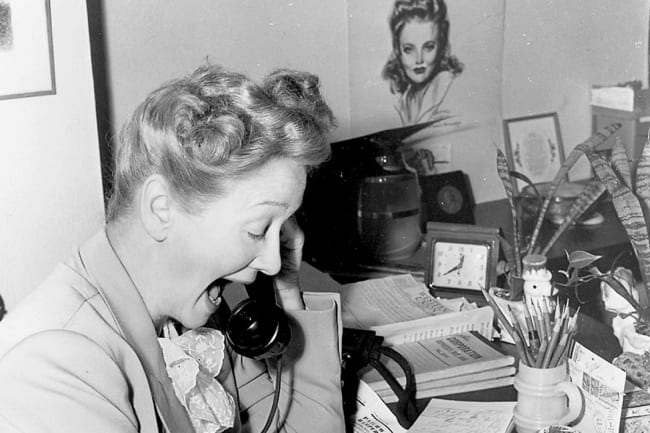
Hedda Hopper
Outspoken Gossip Columnist
Hedda Hopper, (May 2 1885- February 1, 1966) was a famous gossip columnist and actress. Hopper began her own gossip column, “Hedda Hopper’s Hollywood” in 1938 where she attacked and criticized people who were mostly actors, actresses, and all of their successes. She also wrote about her political views which rose tension, and rivalries with another famous gossip columnist, Louella Parsons. Hollywood remembers Hopper as “unpredictable and ruthless,” “a vicious witch,” and a “Fascist,” all because of her “malicious” writings.
Hedda Hopper had a longing fascination of being an actress and being in the spotlight from the beginning. When she was older she moved to New York to pursue her dream. She gave up her career when she got married, only to get divorced from her husband years later. She was offered roles later, but nothing exponential. She says in her book From under my Hat, “I wasn’t a star, only a featured player in support of the big shots.” Her roles diminished, so she explored other job options, but settled in Hollywood where she began her gossip column.
Hopper became popularly known for the many tasteful but sometimes bizarre hats that she trademarked. Hopper wore these hats out in public, which often provoked women, but she received a great deal of attention from men. It was often said that the hats “inspired men.” Hopper said in her book, “if a hat can get the attention of this many people, I’ll never go bareheaded again.” Hopper was always receiving attention because of her style, and the amount of confidence she had in herself was vast.
With Hopper’s job being so competitive, she was often in disputes with “the reigning queen of gossip”, Louella Parsons, another gossip columnist. In Hopper’s book, From Under my Hat, Hopper talks about her relationship with Louella and says, “In the beginning I’m pretty sure Louella liked me. She might yet if my column hadn’t caught on.” Their problems started when Parsons wrote an article containing false information, Hopper corrected the information in another article, and this embarrassed Parsons greatly. They tried making peace, but it didn’t last. Hopper cared about this relationship and tried to make amends, but wouldn’t let something like this stop her career. She was extremely devoted to it and confident, not afraid to get into altercations.
Hopper’s influence in Hollywood made it daunting to be on bad terms with her. One of her many famous disputes was with Charlie Chaplin, a filmmaker in the 1940’s and 1950’s. He was a British citizen in the United States, a supporter of liberal views, and he often engaged in relationships with young women. Hopper supported his film work, but her political and moral views clashed with his lifestyle. She began working on smearing his name in Hollywood. An actress by the name of Joan Barry visited Hopper one day. She was in a sexual relationship with Chaplin, which then ended, but she later found herself pregnant. She wasn’t sure what actions to take as he refused to meet with her. Hopper helped this girl and “encouraged the paternity lawsuit against Chaplin.” Chaplin was confirmed the father after a blood-test, and received charges after indicting him “for violating the Mann Act.” This led to a hate campaign and Chaplin being denied re-entry into the United States. In fact, in a journal titled “Hollywood Gossip as Public Sphere: Hedda Hopper, Reader- Respondents, and the Red Scare,” one of Hopper’s readers wrote, “We like your way of speaking out against subversion and policies detrimental to our form of government. Hedda was very outspoken about her views politically and morally.
Hopper had controversial approaches on how she accomplished her work as a gossip columnist. Hedda wrote many times of instances that occurred in the private life of her subjects, one of her most famous being about James Roosevelt. At the time of this article, James was the son of the current president, Franklin D. Roosevelt. She conducted an interview with him where she questioned his current marriage status and asked if divorce was something him and his wife were considering. Later, news broke that this interview “had occurred at 11:15 p.m. on a Saturday night outside Roosevelt’s Beverly Hills home, as a ‘disheveled… Jimmy came out in bare feet and bathrobe.’” Hopper went above and beyond to get the story she wanted to publish. She wrote the article calling James “the young scion of the No. 1 political family in America.” Hopper gladly wrote things in her column that shattered families, friendships, marriages, and careers.
The Telegraph wrote an article about Hopper, starting with the title “Hedda Hopper: The woman who scared Hollywood,” and continuing with this valiant line, “With one scathing sentence, Hopper gleefully ruined careers and marriages with a clear conscience. She smeared public and private life with politics and celebrity.” She was self-assured in her work and didn’t mind the attention she received.
Hedda Hopper changed the way Hollywood heard about gossip through her incredibly flamboyant ways that so many admired, but that so many were afraid of.
